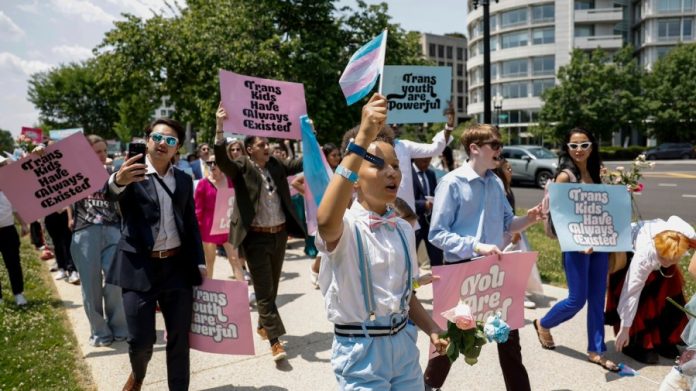
The Supreme Court agreed Thursday to decide whether states can ban transgender athletes from competing on girls’ and women’s school sports teams.
The justices said they would hear appeals from Republican leaders in Idaho and West Virginia defending their state bans. A decision is expected by next summer.
The move sets up another major dispute over transgender rights before the conservative-majority court that recently upheld Tennessee’s ban on gender-affirming care for minors.
In the wake of that decision, the justices on Monday sent back to lower courts disputes involving Idaho’s Medicaid prohibition on transition-related surgeries, North Carolina’s similar ban in its state-sponsored health plan and Oklahoma’s refusal to change the listed sex on transgender people’s birth certificates.
But the Supreme Court held onto the transgender athlete cases that had piled up on their docket, weighing requests from Idaho and West Virginia’s Republican attorneys general to get involved now.
The justices’ decision next term stands to impact a wave of laws restricting transgender athletes’ participation in 27 states. In 2020, Idaho became the first state in the nation to ban trans students from competing on teams that match their gender identity.
In February, President Trump signed an executive order opposing transgender women and girls’ participation in female sports.
“Female athletes are losing medals, podium spots, public recognition, and opportunities to compete due to males who insist on participating in women’s sports,” Idaho wrote in its petition. “So much of what women and girls have achieved for themselves over the course of several decades is being stolen from them—all under the guise of ‘equality.’”
The laws have sparked an array of legal challenges that argue they violate the 14th Amendment’s Equal Protection Clause and Title IX, the federal law against sex discrimination in schools.
Many of the challenges are spearheaded by the American Civil Liberties Union (ACLU), which represents the plaintiffs in both Idaho and West Virginia.
In Idaho, the civil rights group represents Lindsey Hecox, a transgender runner who wanted to compete on Boise State University’s women’s track and cross-country teams. Lower court rulings allowed Hecox to try out for the teams, leading to Idaho’s latest appeal.
“Petitioners seek to create a false sense of national emergency when nothing of the sort is presented by this case. This case is about a four-year old injunction against the application of H.B. 500 with respect to one woman, which is allowing her to participate in club running and club soccer in her final year of college,” Hecox’s legal team wrote in court filings last year.
The ACLU similarly urged the court to turn away the appeal in West Virginia, where a lower court blocked the state from enforcing its ban against Becky Pepper-Jackson, a high school student who throws discus and shot put for her school’s girls’ track-and-field team.
When Pepper-Jackson first sued the state over its restrictions on transgender athletes, she was 11 years old and in middle school.
Both Idaho and West Virginia’s attorneys general brought on Alliance Defending Freedom, a conservative Christian legal powerhouse, to defend their bans.

